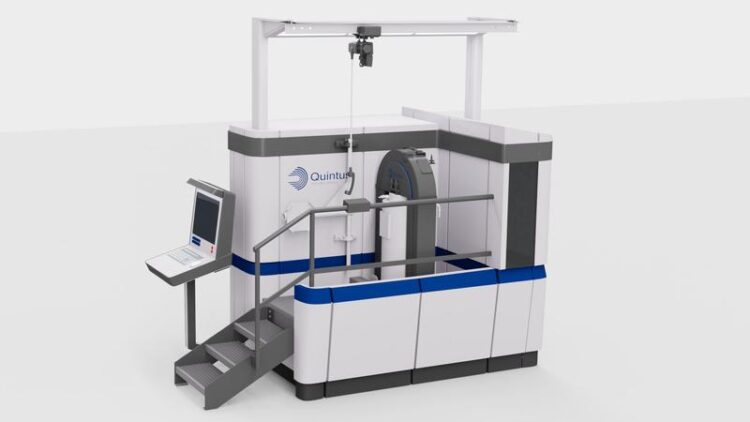New possibilities in pressure-supported heat treatment

New facility at Fraunhofer IFAM Dresden: Quintus Hot Isostatic Press QIH 15L
Image: Quintus Technologies AB
The Fraunhofer Institute for Manufacturing Technology and Advanced Materials IFAM in Dresden is strengthening its technological expertise in the field of pressure-supported heat treatment with the new acquisition of a Quintus Hot Isostatic Press QIH 15L. This significantly expands the possibilities, which were previously focused on spark plasma sintering technology.
The researchers see the main areas of application for the new facility in, on one hand, the development of combined processes, i.e. heat treatment and hot isostatic pressing (HIP) for materials with complex heat treatment. Examples include nickel-based superalloys and intermetallic materials such as titanium aluminides.
On the other hand, the new machine is also of enormous importance for additive manufacturing. For example, existing HIP treatments are to be optimized and adapted to additive manufacturing processes, which involves different microstructures compared to conventional manufacturing technologies. The HIP process is also to be combined with the additive manufacturing process in order to significantly save process time here, for example.
Short distances are a big plus for developments, which is why the new system will be installed in the Innovation Center Additive Manufacturing ICAM® of Fraunhofer IFAM Dresden. Here, the institute bundles its various technologies for additive manufacturing. From selective electron beam melting and 3D screen printing to fused filament fabrication, gel casting, and MoldJet – the institute offers its customers a comprehensive portfolio for customized solutions from a single source.
Of course, the new system is not only used for R&D projects, but can also be used as a service for carrying out predefined HIP cycles.
Customers have access to a furnace chamber with a diameter of 170 mm and a height of 290 mm at a maximum pressure of 200 MPa and a maximum temperature of 1400 °C. The system is equipped with the URQ® technology, which enables the highest cooling rates of up to 10³K/min to be achieved. This makes it possible to carry out multi-stage heat treatments in the actual HIP process.
Wissenschaftliche Ansprechpartner:
Dr.-Ing. Uwe Gaitzsch
Weitere Informationen:
https://www.ifam.fraunhofer.de/en/Profile/Locations/Dresden/pressemitteilungen0/…
Media Contact
All latest news from the category: Materials Sciences
Materials management deals with the research, development, manufacturing and processing of raw and industrial materials. Key aspects here are biological and medical issues, which play an increasingly important role in this field.
innovations-report offers in-depth articles related to the development and application of materials and the structure and properties of new materials.
Newest articles

Innovative 3D printed scaffolds offer new hope for bone healing
Researchers at the Institute for Bioengineering of Catalonia have developed novel 3D printed PLA-CaP scaffolds that promote blood vessel formation, ensuring better healing and regeneration of bone tissue. Bone is…

The surprising role of gut infection in Alzheimer’s disease
ASU- and Banner Alzheimer’s Institute-led study implicates link between a common virus and the disease, which travels from the gut to the brain and may be a target for antiviral…

Molecular gardening: New enzymes discovered for protein modification pruning
How deubiquitinases USP53 and USP54 cleave long polyubiquitin chains and how the former is linked to liver disease in children. Deubiquitinases (DUBs) are enzymes used by cells to trim protein…



